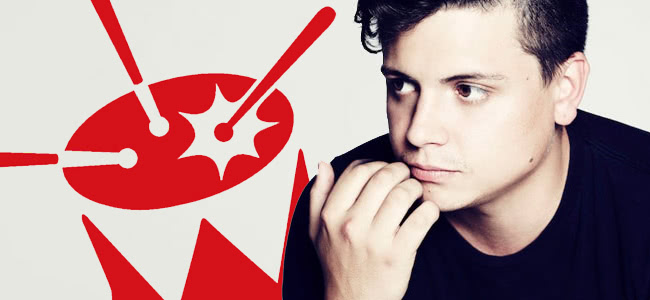The debate surrounding Triple J’s influence on the Australian music scene has intensified in the last couple of days.
Following a Fairfax article that investigated claims that bands were altering their sound to secure airplay on the ABC youth broadcaster, Triple J Station Manager Chris Scaddan hit back, refuting claims that the station has a bias towards particular kinds of music, or that artists needed to curry favour with Triple J.
While some musicians and industry figures have thrown their support behind the station following the backlash, today sees a high-profile musician joining the chorus of detractors.
Whitley has lashed out at Triple J in a public statement issued earlier today, “JJJ has an excruciatingly narrow-minded playlist that caters for the lowest common denominator,” he says.
“In my opinion they’ve failed as a tax-payer funded radio station that is supposed to challenge and present new ideas for the youth of Australia. I find them barely distinguishable from a commercial radio station, which is why I listen to, and support, community radio such as RRR, FBi, PBS and university radio stations.”
The catalyst for the scathing attack from the singer-songwriter, which appeared on his Facebook page, comes in response to Whitley’s absence from the default voting list for Triple J’s iconic Hottest 100. “JJJ has an excruciatingly narrow-minded playlist that caters for the lowest common denominator. In my opinion they’ve failed…”
Unlike the reams of Aussie acts who are humorously fishing for votes in the annual countdown (see: Sticky Fingers’ ocker propaganda spoof and Illy’s ‘undercover’ exposé) as the polls draw to a close, Whitley – real name Lawrence Greenwood – has instead criticised the station for their lack of support.
Love Music?
Get your daily dose of metal, rock, indie, pop, and everything else in between.
Responding directly to a status asking “sorry but how the fuck does Whitley not get listed in triple j hottest 100 list!” Whitley begins his status by replying: “Because JJJ didn’t play any of Even The Stars Are a Mess,” writes Greenwood in his fiery post, referring to his third studio album released in July last year, breaking a four year silence between records.
Acknowledging a ‘bite the hand that feeds’ scenario (much like Wolfmother’s Andrew Stockdale), Whitley adds: “While I appreciate the airplay JJJ gave me, and recognise their role getting me started, as a tax-paying Australian, I reserve the right to criticise the changes in JJJ over the last decade, which I see as detrimental to the expansion and nourishment of young minds of limitless potential.”
“I’m not the only one who feels this way. The overwhelming majority of musicians, songwriters and music journalists I’ve spoken to over the last 8 years share these views,” adds the singer-songwriter, whose critiques echo the sentiments of some of the anonymous musicians interviewed for the original Fairfax article that originally stoked the Triple J debate, which painted the ABC station as a ‘make or break’ dictatorship.
Responding to claims of bias, Triple J Station Manager Chris Scaddan refuted the idea of a ‘Triple J sound‘. “We’re never looking for one particular sound, we’re looking for songs that stand out and resonate with our audience,” he said. “Basically we’re looking for good music, as shown by the range of artists and styles currently played on Triple J.”
Scaddan was also confident Triple J was still providing a healthy alternative to commercial radio, playing 47% Aussie content (nearly double the 25% Government enforced quota)in 2013 to its average weekly audience of 1.8 million listeners.
“People can get frustrated with Triple J if we’re not adding their acts to high rotation or playing their songs and that goes with the territory,” Scaddan previously remarked.
In further commentary to his original Facebook post, Whitley admits that he knew that Even The Stars Are A Mess “wasn’t going to be a summer banger,” but that the Triple J snub is about a larger issue.
“I was aware JJJ wouldn’t play that album because it didn’t have a JJJ sound, but the whole point to what I’m saying is that there shouldn’t be a JJJ sound,” he explains. “It should be ideologically based on variety and difference, not conforming to a playlist that has a very narrow set of criteria to qualify it.” “I was aware JJJ wouldn’t play that album because it didn’t have a JJJ sound, but the whole point is there shouldn’t be a JJJ sound.”
One commenter cautions the musician for taking a swipe at the same station that has supported Whitley in the past; “this is dangerous territory. Don’t get bitter bet better. My advice… delete this thread,” he writes.
To which Whitley responds “I’m not bitter mate. Community radio picked up my music enthusiastically, and considering the way that I see the current state of the JJJ culture machine, that’s a massive compliment.”
Greenwood also says he’s previously voiced his opinion, on “JJJ, live to air in 2010”, about his concerns that the station was “becoming too commercially involved.”
“Just because something is popular doesn’t mean it’s right. JJJ are funded in a way that means that they can circumnavigate having to placate the masses,” Whitley expresses.
“JJJ for a long time was on the fence, but it appears to have committed itself to being overwhelmingly predictable and dull. I’m not bitter, I promise…but I do think it’s a sad waste of what was a great station. They could be presenting some challenging ideas and sentiments, but they’re not, they’re just doing exactly what they need to do to be more popular.
“We’re talking about an ideological issue, nothing more and I reserve the right to have that opinion, without anger, because I believe it will better serve the young humans that I think are being undersold and placated.”

































